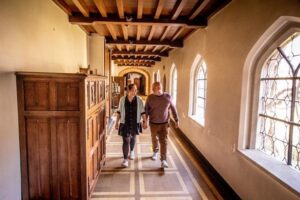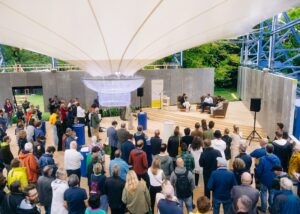Nurturing Sustainable Tourism
Join us as we explore Flanders’ sustainable tourism endeavors and success stories.
VISITFLANDERS, the organization charged with managing the destination, is reshaping tourism in Flanders, where sustainability is the cornerstone of every venture. Anchored by community collaboration and eco-aware practices, the region is crafting a tourism blueprint that cherishes heritage and envisions a vibrant, community-led approach.
The ‘Travel to Tomorrow’ vision encompasses diverse sectors, underlining the pursuit from preserving historical gems like Saint Godeliva Abbey to addressing cruise tourism’s eco-impact, fortifying Flanders’ economic, social, and environmental realms. Flanders seamlessly merges historical richness with modern sustainability aims, illustrating a forward-thinking tourism model.
Flanders Sustainability Initiatives & Impact Stories
Destination Flanders has integrated sustainability at every level. From rehabilitating historic sites like Saint Godeliva Abbey to examining the impact of cruise tourism and MICE, Flanders ensures that its tourism offerings are both enriching and responsible.

Saint Godeliva Abbey
Saint Godeliva Abbey’s transformation is a testament to Flanders’ innovative approach. Set to become a community-centric hub by 2026, the efforts include reintroducing Flemish heirloom varieties to its gardens and modern water conservation methods that nod to historic practices.

Cruise Tourism in Flanders
Cruise tourism, contributing to a significant portion of CO2 emissions, hasn’t escaped Flanders’ scrutiny. Comprehensive studies have led to actionable recommendations, such as introducing passenger quotas, ensuring that the balance between tourism and sustainability is maintained.

Green Conferences and Events
Flanders takes its conferences and events seriously, emphasizing venues that prioritize energy and water conservation. Resources like its Sustainability Guidelines for Events are more than just tools; they represent a commitment to sustainable practices.
The Pavilion at Stories Unfold is a great example of sustainable events in Flanders. The pavilion rests on screw piles that are wound into the ground much like a screw into wood, which minimizes the environmental impact by eliminating the need for pouring a concrete foundation. After Stories Unfold, the screws will be neatly removed, leaving no trace whatsoever.
Additionally, the pavilion walls consist of classic formwork panels that are normally used to pour concrete, but now serve as a framework for the surroundings and to bring the outdoors indoors.
Partnerships & Collaboration
Collaboration is key to Flanders’ approach. Partnerships with organizations like NECSTouR are driving change, focusing on creating actionable plans to monitor and reduce greenhouse gas emissions, while also sharing insights and best practices.
The vision is collective progress, where every stakeholder plays a role in shaping a sustainable future for tourism.
Our thanks to the team at VISITFLANDERS for sharing resources and information supporting our overview of this trailblazing region and destination.
Curious how destinations in other parts of the world approach sustainability?
Visit our leading sustainable destinations section for additional stories and good practice examples!

